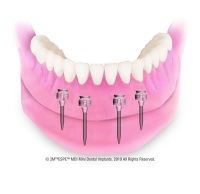Utilize our Advanced Dental Procedures Performed by Your Canton OH Dentist
Dental Implants
- Implants are extremely natural looking
- Fusion of the implants into your jaw make them very stable and comfortable compared to traditional dentures
- They can last a lifetime
- Implants are expensive and a major financial investment
- The process of getting implants can be time-consuming and requires multiple visits to the dentist
- There is a chance the surgery fails (roughly 5% of the time)
- Root form implant: This is the most common type of implant where the screw is shaped like the root of a tooth.
- Plate Form Implant:A plate form implant has a flat and long shape and is better suited for a narrow jawbone.
- Subperiosteal Implants: In some cases where there is not enough bone width or height for the root form or plate form implant, a subperiosteal implant may be prescribed. This type of implant is designed to sit on top of the bone but under the gums.
Mini Dental Implants
Dental implants are becoming an increasingly popular method for replacing missing teeth. In this procedure, titanium supports are surgically fused with your jawbone, and act as an anchor for naturally looking false teeth. Dental implants are not only used for individual tooth replacement but can also be used when replacing multiple teeth as an alternative to dentures.
Dentures
Denture Basics: Information for First-Time Denture Wearers
We all hope our natural teeth will last a lifetime. But when this isn’t possible, dental professionals can offer a number of options to restore oral function and appearance. Thanks to advances in polymer science, the vast majority of dentures are now made with extremely high-quality, durable plastic, and are stronger, more comfortable, and more natural looking than ever before. In short, these are not your grandmother’s dentures!
- Complete dentures replace all of the teeth on the upper and/or lower jaw and rest on the gums that cover the jawbone. These dentures can be made more secure when attached to one or more tooth roots (overdenture) or to dental implants (implant overdenture). Some implant overdentures can be removed by the wearer and others can be removed only by a dental practitioner.
- Partial dentures replace only some of the teeth and attach to the remaining natural teeth with clasps or mechanical components known as attachments (precision and semi-precision partial dentures, also called attachment partial dentures.) Your dentist or prosthodontist (a dentist who specializes in restoring and replacing teeth) will help you decide what type of denture and treatment plan are best for you.
- Impressions or molds of the contour of the mouth used as a model for the denture
- Extractions to remove any unhealthy teeth
- Implant surgery for those receiving implant overdentures
- Adjustments to achieve the best fit and level of comfort once dentures are placed
- A feeling of fullness in the mouth, face, lips, and/or cheeks, which will subside quickly.
- Temporary minor changes in speech sounds, which will be more apparent to you than to others.
- Tip: Speaking slowly and enunciating precisely helps the tongue and facial muscles adapt more quickly.
- Changes in chewing patterns while getting used to the jaw movements required for chewing with dentures, which may take several weeks.
- Tip: Start with small pieces of soft food, gradually increasing the food’s firmness, and chew food on both sides of the mouth simultaneously with only your back teeth. A small amount of denture adhesive may help to stabilize your dentures.
TMJ Treatment
- Headaches
- Earaches
- Trouble/soreness in opening and closing the mouth
- Clicking or popping of the jaw
- Pain in the jaw muscles
- Soreness in the area, sometimes extending to the face










